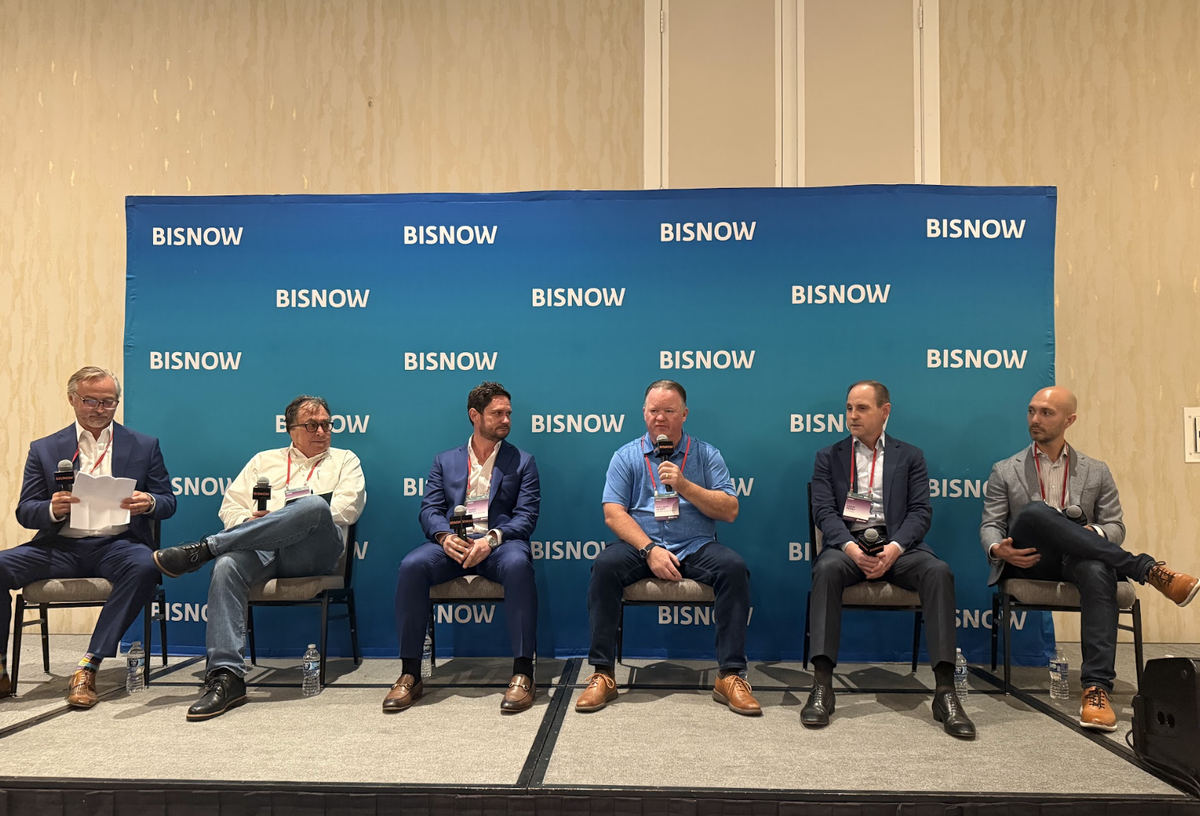Widespread uncertainty about tariffs, federal policy and the economy is hanging over projects and deals in Los Angeles, but not everyone is feeling the impacts yet.
Tariffs are just one of the macroeconomic factors working to create a blanket of uncertainty covering the market right now, Andrew Parker, partner at Bayspring Real Estate Partners, said at Bisnow’s Los Angeles Construction and Development Conference.

Bisnow/Samantha D’Angelo
Citrin Cooperman’s Joe Gubic, Rexford Industrial’s Brian Garcia, DPR Construction’s Marc Ness, LaTerra Development’s William Leahy, CityView’s Adam Perry and Trammell Crow Co.’s Andrew Wallace.
That uncertainty is making it harder to anticipate critical aspects of a project, from costs to performance upon completion, and that’s making it hard to get things going.
The difficulty isn’t just from tariffs, Parker said at the June 26 event, held at the Hilton Los Angeles Culver City.
“We’re in an environment where it’s harder to do deals right now, and so probably a lot of us in this room have a little bit less work than we would otherwise want,” he added.
Few drew a straight line from the tariffs to negative impacts on their projects, but those who did pointed not to feeling the pain of cost increases but the challenges that arise from not knowing how or when there will be a resolution to the back-and-forth.
“I feel like the unknowns of the tariffs right now are really stalling a lot of projects,” DPR Construction Southern California Lead Marc Ness said. “At least, if we knew it was going to for sure happen, we could make deals accordingly.”
The lack of information creates a situation where people must plan and prepare for something they don’t know will come. Some panelists spoke of having to figure out where all their materials come from and finding ways to swap them out for domestically made replacements if needed. Others were trying to buy materials as soon as possible in case the prices of those materials rose sharply and suddenly.
But for some, tariffs were the least of their worries so far.
“To us, the tariffs have been kind of a nothingburger,” said Dewain Campbell, a director of construction and development at McCarthy Cook.
His company has a couple hundred million dollars worth of projects in progress, and so far, tariffs haven’t “trickled out into anything that’s concerning,” Campbell said.
Campbell pegged his cost increases at around 3% on materials like steel and rebar, but he said that, because his company doesn’t often use lumber, he might not see the same financial impacts as other builders that frequently use it.

Bisnow/Samantha D’Angelo
Allen Matkins’ Ari Shaeps, Brookfield Properties’ Jennifer Mulligan, Bayspring Real Estate Partners’ Andrew Parker, Avana Cos.’ Sanat Patel, Prologis’ Maggie Xu and McCarthy Cook’s Dewain Campbell.
“I just don’t think it’s that big a deal, and it’s nothing to worry about at this particular moment — more than just everything that we have to worry about in real estate development,” Campbell said.
The range of responses to the effects that tariffs were already having and could have on the development and construction industry was a stark contrast to predictions from academics and business industry groups, which have been sounding the alarm about the impacts that these duties could have on California.
While some of these groups have voiced a great deal of concern for what could happen if proposed tariffs are permanently imposed, many of these groups argue that a great deal of damage has already been done by the lack of predictability that the specter of tariffs has created across multiple industries.
A UCLA Anderson School of Management forecast anticipates the state’s economy is likely to contract later this year due to the effects of expected tariffs and immigration raids on critical sectors. Construction and hospitality were expected to be among the most impacted industries by these events.
“Because people are afraid to go to work, because companies don’t know what their cost structure is,” and because of broad uncertainty among consumers about the stability of their employment, there is “widespread decision paralysis in terms of making investment in consumption and labor decisions,” Jerry Nickelsburg, the director of the Anderson Forecast and author of the California report, told the Los Angeles Times in a June interview.
Nickelsburg said paralysis would be resolved once there is more clarity and predictability around the U.S.’ long-term policies, but that clarity has yet to materialize.
In the meantime, the impacts of the unpredictability are slowly ballooning and are expected to grow, business leaders such as the Los Angeles Area Chamber of Commerce have said.
